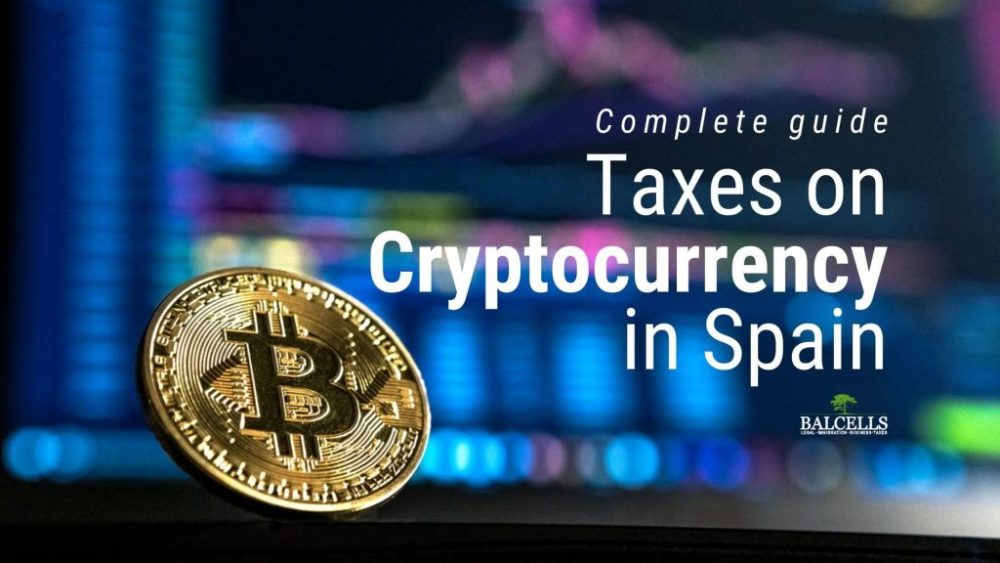Cryptocurrency taxes in Spain
Earlier at Andorra Insiders, we explained how to treat cryptocurrencies and bitcoins in Andorra. However, we confirmed that, despite the fact that the vast majority of jurisdictions in all countries of the world are pointing in the same direction, and this is already very clear, ordinary people are ignoring the tax treatment of these assets, especially in Spain.
That is why, taking this country (Spain) as an example, since it is our closest country and the origin of our main clients, and given that this is similar to most countries in the world, in this article we are going to explain the tax treatment of cryptocurrencies. All in order to dispel doubts and prevent people from taking unnecessary risks and paying taxes incorrectly or, even worse, not paying taxes, thinking that they are doing everything right.
Initial problem
When creating a regulatory framework, formal definitions must be established in order to be adhered to. Cryptocurrencies, born with bitcoin in 2009, are such a new asset that in the early years it was not very well known what definition these assets fit, which are, on the one hand, completely intangible, and on the other, completely decentralized (for example, , ¿ Does the owner of bitcoin really own the asset or is he on the network?), they are a separate market and completely different from those that came before them. It didn’t matter either, they weren’t relevant enough yet to take care of them. It was the time of the “first followers”.
So that we get an idea of what we mean by legal definitions, if we take into account that bitcoin is a common and current commodity, if I were to mine BTC and sell said bitcoin to third parties, I would have to charge them VAT and bill them for the sale of the final commercial product. In addition, the location of the generated bitcoin and the operation performed (for example, if I, as a Spaniard, sell a newly mined bitcoin to an Italian, do I have to invoice Spanish or Italian VAT? Bitcoin? Or no indirect tax?).

On the other hand, if we consider Bitcoin not as a normal and current commercial commodity, but as a currency or means of payment, the regulations, as well as the legal and tax regime of the entire market, will be very different. Among other things, the sale of these assets will no longer be burdened with indirect taxes, as it was before. It is because of this that the legal definition of cryptocurrency is critical to the establishment of the regulatory framework and its tax regime. In the absence of specific legislation, they are a vague legal concept.
Jurisprudence as a source of law in cryptocurrencies
Due to, among other things, the short time in which they declared their assets, their enormous growth and rapid evolution and, above all, the innovative, technological and disruptive nature of these digital assets, practically the only way to establish its legal regime is through judicial practice. Completely bureaucratic, rigid, outdated and inefficient institutions, such as the institutions of European countries and Europe itself, are lagging behind the progress of technology such as this, distributed consensus algorithms.
Especially when you consider that the goal of cryptocurrencies is to eliminate intermediaries and minimize the necessary trust in exchanges and financial transactions. It is not only that this market is developing at a pace that is almost impossible for the current institutions to imagine, but that they almost go against them by offering a more efficient way of organizing society.
Bitcoin as a means of payment
Thus, the judgment of the Court of Justice of the European Union (CJEU) in case C-264/14 of 22 October 2015 was the first relevant development in this regard. It acknowledged that Bitcoin was legal tender or “virtual” currency, although it was not legal tender. (and, by extension, the rest of cryptocurrencies, although they and their uses vary greatly, and some of them are likely to be interpreted differently). And therefore, Transactions carried out with them, such as sale or exchange for other fiat currencies, are exempt from value added tax (VAT) taxation.
This is because they can benefit from the exemption applied by the VAT Directive to transactions involving “foreign currencies, banknotes and coins that are legal tender”, although transactions “are benefits
services provided for remuneration within the meaning of the Directive, insofar as they consist in changing different means of payment and there is a direct relationship between the service provided and the remuneration received, that is, the margin formed by the difference between On the other hand, the price at which you buy the currency, and, with on the other hand, the price at which you sell it to your customers.
Consequently, by assigning Bitcoin the legal tender category as a virtual currency, it was exempted from indirect taxes. The same thing happened with the Inheritance Transfer Tax (ITP), a fairly common tax at the European level. However, as we shall see later, this also established jurisprudence as to the tax treatment of other taxes. For example, such a cryptocurrency exchange becomes the equivalent of investing or speculating in the Forex currency market.
Cryptocurrency taxes in Spain
As it could not be otherwise, the tax regime of crypto assets in Spain was established through the Compulsory Requests from the General Tax Office, which can be found at this link, establishing jurisprudence on the basis of some first cases regarding the applicable general rules.
Value Added Tax (VAT)
According to the decision of the CJEU, in Spain since 2015 bitcoin has been considered a means of payment, and therefore its transfer and sale are declared exempt from VAT as established by the Law itself (Article 20.1.18). This is because the same exemption assumptions apply as for traditional currency transactions. This applies even when it comes to profits or commissions, as they are understood under the concept of “other commercial effects” (Article 135.1.d) as a means of payment and thus remain outside the scope of this tax.
On the other hand, with regard to the mining of cryptocurrencies, this is also an activity exempt from VAT taxation, since it is not considered that there is a direct relationship between the service provider and the recipient, since this activity automatically generates the cryptocurrency that is stored by the miners. This is an argument similar to that used in the sale, in which it was not considered that there was a direct relationship between the service provided and the consideration received.

In this sense, you can search the previous link for V3625-16, V1028-15, V1029-15, V2034-18, V1747-18, V1748-18, V2670-18 and V2846-15 to see what they all are follow this argument and this appeal. The latter, very interesting, offers activities through ATMs and machines. In this case, the entity will be considered an entrepreneur for VAT purposes. as you have to pay for its services, “because it is designed to buy and sell virtual currency through ATMs and vending machines in exchange for a commission.”
Personal Income Tax (PIT)
With regard to personal income tax, If an individual carries out transactions with cryptocurrencies, he will profit from economic activities through mining or intermediation. when buying and selling cryptocurrencies that result in disruption of activities on the general basis of this tax, either a non-professional or professional individual (with certain requirements). These incomes are affected both by performing activities for one’s own account and by working for another employee as an employee.
On the other hand, the sale of these crypto-assets, provided that this is not carried out in the field of economic activity, will result in a capital gain or loss that will arise from the difference between the purchase price and the transfer price (art. 34). As with any other asset, consideration of capital gains or losses from each of the various transactions is thus integrated into the savings base of the personal income tax return, as referred to in articles 33 et seq. law.
With regard to the moment of sale and the transmission price, the moment of delivery is considered by the virtual currency taxpayer on the basis of the sales contract, regardless of when the sale price is received.
Thus, cryptocurrencies are effectively taxed on capital gains and losses when purchases and sales (investments) are made with them. offsetting losses with profits and declaring and paying net taxes at the end of the financial year on the basis of personal income tax savings. All of this is confirmed by requests V0808-18, V1604-18 and V0999-18.
Is it taxed only when switching to fiat? Or do I have to pay taxes every time I change cryptocurrency?
This is the most confusing aspect in the world of cryptography, which is why we have dedicated a section for it. Currently, there are exchanges or exchange offices where, having bought one cryptocurrency, you can exchange one for another or “buy”, for example, Ethereum using bitcoins. As a consequence, it is a hoax that you only have to pay taxes when this capital is re-introduced in fiat currency, like the euro, and that in doing so, the income received from the exchange between cryptocurrencies is not considered calculated.





